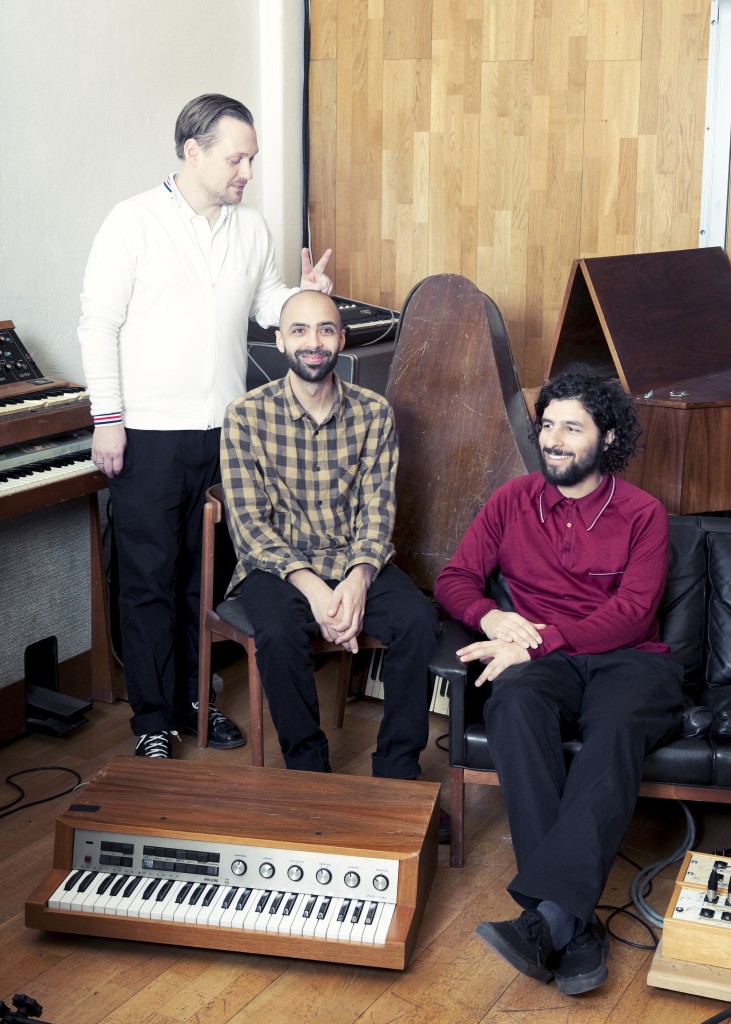This is a general admission, standing event. Happy hour from 6-7pm including $3 beer and $5 well drinks.
Junip – SOLD OUT!

José González is describing the entire process – writing, recording, life – that went into the creation of Junip, the upcoming, self-titled album from the band he fronts alongside drummer Elias Araya and keyboardist Tobias Winterkorn, due for release on April 23rd by Mute . “All the ups and downs were very ‘Junip,’” he adds, “so titling it with our name seemed appropriately iconic. It’s truly a band album.”
The distinction is important in Junip’s case, whose evolution has been a long, strange trip, indeed. The group actually formed in 1998 in Gothenburg, Sweden, but Junip didn’t actually release its acclaimed first album, Fields, until 2010. That delay stemmed largely from the success of González as a solo artist. The renowned singer-songwriter found international acceptance with his individual albums, 2003’s Veneer and 2007’s In Our Nature, which went on to sell over a million albums worldwide; audiences were captivated by the stark combination of González’s uniquely haunting voice and sinuous acoustic guitar on hits like “Crosses” and “Down The Line,” and distinctive interpretations of covers like The Knife’s “Heartbeats.” They were startled and beguiled, then, by hearing González in Junip’s band context, and one with such a propulsive, experimental bent: sprawling away from the stark folk aesthetic of González’s solo efforts, Fields teemed with driving motorik rhythms, psychedelic atmosphere, and dense synth textures.
Junip avoided the protracted evolution of Fields, however, and as a result resounds with immediacy. “With Junip, and this album in particular, it’s not the kind of stuff that ends up on my solo recordings,” González notes. After touring extensively in the wake of Fields, Araya, González, Winterkorn found themselves gelling as a unit like never before, able to access uncharted new sounds and emotions with newfound fluidity. “We’d press ‘record’ when we started jamming, and end up with a pretty complete song structure when we finished,” González explains.
Just as with the first album, Junip was recorded in the trio’s rehearsal space over the course of a year, self-produced by the band with help from Don Alsterberg (sound guru to artists like Soundtrack of Our Lives, International Noise Conspiracy, and Graveyard). The song “Villain” proved to be a breakthrough for Junip, with a tribal garage-rock stomp, fuzzed-out analog bassline, and electro-pop synths contrasted by a spooky, subtly sinister vocal. According to González, “Villain” represents “the sound of us not constraining ourselves. We weren’t concerned about noise, or being too distorted or musically correct. It was more about vibe, or feeling – it didn’t matter what we did, as long as it felt good.”
Just as Fields pushed boundaries and expectations, Junip expands the stylistic palette yet again with unexpected juxtapositions. “We’re somewhere between a German jazz band and an African pop band,” González cracks. As such, infectious album opener (and first single) “Line of Fire” layers Beatlesque melody on top of a hypnotic groove that splits the difference between flamenco syncopation and krautrock repetition, González’s heartfelt vocal cresting with emotion as the track builds towards a symphonic climax. “Baton” also introduces González’s infectious newfound whistling technique, where he creates hooks literally out of thin air. “I’ve been doing the whistle thing a lot,” he says. “I bought these expensive Neumann mics, and noticed if you whistle into them, they give off a slight distortion; there’s something about the overtones and coloration hitting the root that gives it a Brazilian vibe. It’s a nice way to find melodies – you get the pure melody and nothing else.” “Your Call,” meanwhile, proves a total departure – a synthesized pop-disco confection suggesting the union of Hot Chip and Human League, its infectious drum-machine handclaps and exuberant singsong chorus belying a melancholy sentiment (“It’s your life, it’s your call/Stand up, or enjoy your fall”). “It felt like trying on new clothes when we first listened to it – it took a while to get comfortable with it, but now I like it a lot,” González says.
Junip’s powerful instrumental interplay, meanwhile, reveals itself throughout: having nimble players to react to pushes González’s picking to raggedly virtuosic sublimity on tracks like “Suddenly,” where he hybrids the singular pocket of Western African guitar music into his own sound. “When José first showed us the idea for ‘Suddenly’ on guitar, Elias and I were blown away,” says Winterkorn. “It’s so beautiful – it sounds like improvisation, but it’s not.” “I stepped out of my comfort zone in that song,” González confirms – not just musically, but lyrically as well, due to its uncharacteristically uplifting message (“Found myself in deep dark thoughts/When suddenly there was you”). “I always felt like it would be nice to write a song free of any negative subjects or thoughts,” González says. “
“Suddenly” is the album’s exception, however. The intimate beauty of the music on Junip often contrasts with a surprisingly dark melancholia, commencing with the very first lines heard on the album. “What would you do/If it all came back to you/Each crest of each wave/ bright as lightning/What would you say/If you had to leave today/Leave everything behind/Even though, for once, you’re shining”: so go the opening lyrics to “Line of Fire,” suggesting an existential crisis or journey that plays out over the course of the remaining nine songs. “It’s about growing up and taking responsibility in that moment when all of a sudden your life changes, you’re in a new situation,” González says. “Your ideals are challenged, and you have to think things through from a new angle.”
There’s a reflexive temptation to read that mood as influenced by events in González’s personal life. “There’s a tendency to ask these questions when there may not be answers,” González says. “That’s, in fact, the theme to “Beginnings,’ whereas ‘Line of Fire’ is more about taking responsibility and doing what you can to change your life in a new situation.” For González, the words aren’t meant to be specific, but meant to “make you feel something, and create an emotion. Stuff I think about is more about human nature in general: songs are about love and death – not necessarily relationships, really. There’s a high ambition to reach deep emotions, and I tend to write about these topics.” For him, the key topic remains redemption – “those life-changing moments that shake people up, which unite all the themes. It’s ultimately about how the grass will grow after snow melts away: finding that hopeful feeling between the lines, that’s what the whole record is about.”
photo credit: © Kiara Andreasson
Dawn of Midi

Listenable and insane. That’s the sound Dawn of Midi spent years shaping, culminating in their most mesmerizing work yet: Dysnomia.
In many ways, it’s the first record that truly reflects the trio’s critically acclaimed live show, a test of endurance and trust that involves bassist Aakaash Israni, pianist Amino Belyamani and percussionist Qasim Naqvi performing their compositions note-for-note without ever appearing the least bit predictable. If anything, Dawn of Midi’s sets are as red-blooded and rhythmic as a seamlessly mixed DJ set, casting spells on crowds in the same way the group’s favorite experimental and electronic acts have for decades.
Which explains why The New Yorker‘s music critic, Sasha Frere-Jones, wrote “an hour flew by in what seems like minutes” after witnessing their high-wire act last year, and Radiolab host Jad Abumrad added “[I’ve] seriously never seen anything like these guys.”
Belyamani is quick to say that Dawn of Midi have followed their own internal logic since day one, largely thanks to the fact that they were friends first—playing late-night tennis matches in dimly lit parking lots well before they stepped into a studio or rehearsal space. As such, Belyamani admits its taken quite some time to shift from early improv sessions to the well-oiled machine that makes Dysnomia both a dizzying dance record and a deeply immersive living room listen.
“Playing a locked groove like we do on this record involves a lot of discipline and hard work,” he explains. “You don’t start out that way unless you’re a group of folk musicians from the same village.”
Forget being from the same village; Dawn of Midi’s respective families aren’t even from the same country. Belyamani was born in Morocco, where he “grew up in a culture where people do polyrhythms in their sleep.” A stateside move didn’t happen until he turned 18 and decided to study abroad at CalArts. Meanwhile, Israni relocated from India to Southern California when he was just four months old, and Naqvi’s parents left Pakistan before he was born in Connecticut.
“Both my parents are major music fans,” says Naqvi. “They love old Hindi songs from the black and white film era, and different kinds of traditional music from the South Asian subcontinent. So that stuff has definitely filtered through me somehow, but scales and rhythms from that part of the world are not something that are central to my musical thinking. At least not yet.”
That’s the thing about Dawn of Midi now that they’re based in Brooklyn and touring open-minded markets worldwide: As carefully cultivated as their aesthetic is, it’s also been known to incorporate, willfully and otherwise, such wildly divergent influences and interests as Aphex Twin, the Police, Can and Ms. Pac-Man. And when they really fall for a record—like they did with Dr. K. Gyasi after hearing his highlife hooks in Berlin—it quickly raises the bar of what they want from their own music.
Hence how Dysnomia ended up being recorded, mixed and mastered in its entirety twice. As Israni explains, “Late one night, I realized the record we had just made wasn’t the quantum leap we needed, so we started over. Then it was another year and a half of rehearsing and composing before we could go in the studio again.”
It shows. While the original version was semi-improvised like the trio’s critically acclaimed debut (2010′s First), the final 46-minute cut is a brooding balancing act between a fascination with structure and a desire to create their own definition of dance music. Set aside an hour to experience the multi-movement title track in full and you’ll hear what we mean, as a language only Dawn of Midi truly understands locks into one long, seemingly endless groove and mixer Rusty Santos (Animal Collective, Owen Pallett, DJ Rashad) makes sure every last high-wire hook hits you square in the chest, even the quiet parts.
“It’s interesting with this piece,” says Naqvi. “There’s actual music in the silences. You could almost take the negative space and make something completely different with it.”
“The spaces between the dialogues of the notes are filled in by the body of the listener,” adds Israni, “and they complete the circuit, leaving one option—to dance.”
Dysnomia is out August 6th, 2013 on Thirsty Ear Recordings.

